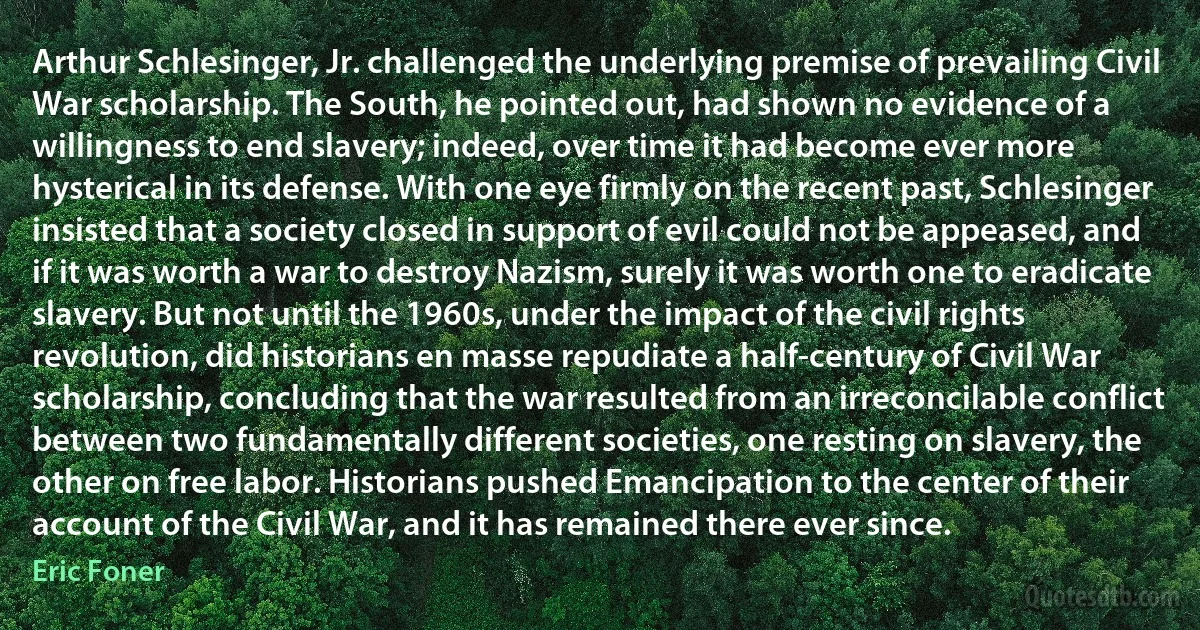
Arthur Schlesinger, Jr. challenged the underlying premise of prevailing Civil War scholarship. The South, he pointed out, had shown no evidence of a willingness to end slavery; indeed, over time it had become ever more hysterical in its defense. With one eye firmly on the recent past, Schlesinger insisted that a society closed in support of evil could not be appeased, and if it was worth a war to destroy Nazism, surely it was worth one to eradicate slavery. But not until the 1960s, under the impact of the civil rights revolution, did historians en masse repudiate a half-century of Civil War scholarship, concluding that the war resulted from an irreconcilable conflict between two fundamentally different societies, one resting on slavery, the other on free labor. Historians pushed Emancipation to the center of their account of the Civil War, and it has remained there ever since.
Eric FonerRelated topics
account concluding different emancipation end evil eye free irreconcilable labor masse past premise revolution scholarship show support time under war willingness worth 1960s nazism half-centuryRelated quotes
No duty can be more sacred than that of maintaining and perpetuating the freedom which the Proclamation of Emancipation gave to the loyal black men of the South. If they are to be disfranchised, if they are to have no voice in determining the conditions under which they are to live and labor, what hope have they for the future? It will rest with their late masters, whose treason they aided to thwart, to determine whether negroes shall be permitted to hold property, to enjoy the benefits of education, to enforce contracts, to have access to the courts of justice, in short, to enjoy any of those rights which give vitality and value to freedom. Who can fail to foresee the ruin and misery that await this race, to whom the vision of freedom has been presented only to be withdrawn, leaving them without even the aid which the master's selfish commercial interest in their life and service formerly afforded them?

James A. Garfield
The Republican Party is strong enough to dare to do right and cannot afford to shirk a duty. The colored men North and South were loyal to the Government in the days of its greatest peril. There was not a rebel or a traitor to be found among them. They ask the privilege of citizenship now that slavery has been forever banished from our country. Why should the great freedom-loving State of Iowa longer deny them this right? No one reason can be given that has not been used to bolster up slavery for the last hundred years. The war that has just closed has swept that relic of barbarism from our land; let the Republican Party have the courage to do justice...I have no fear of the result in a contest of this kind. We shall carry the election and have the satisfaction of wiping out the last vestige of the black code that has long been a disgrace to our State.

Hiram Price
There are two kinds of fears: rational and irrational- or, in simpler terms, fears that make sense and fears that don't. For instance, the Baudelaire orphans have a fear of Count Olaf, which makes perfect sense, because he is an evil man who wants to destroy them. But if they were afraid of lemon meringue pie, this would be an irrational fear, because lemon meringue pie is delicious and would never hurt a soul. Being afraid of a monster under the bed is perfectly rational, because there may in fact be a monster under your bed at any time, ready to eat you all up, but fear of realtors is an irrational fear. Realtors, as I'm sure you know, are people who assist in the buying and selling of houses. Besides occasionally wearing an ugly yellow coat, the worst a realtor can do to you is show you a house that you find ugly, so it is completely irrational to be terrified of them. -Lemony Snicket.

Daniel Handler
There is no need for him to call on me. I am not about to be a party to anything having to do with the law that is going to destroy individual freedom and liberty in this country. I am having nothing to do with enforcing a law that will destroy our free enterprise system. I am having nothing to do with enforcing a law that will destroy neighborhood schools. I am having nothing to do with enforcing a law that will destroy the rights of private property. I am having nothing to do with enforcing a law that destroys your right --and my right -- to choose my neighbors -- or to sell my house to whomever I choose. I am having nothing to do with enforcing a law that destroys the labor seniority system. I am having nothing to do with this so-called civil rights bill. The liberal left-wingers have passed it. Now let them employ some pinknik social engineers in Washington, D. C., to figure out what to do with it.

George Wallace
The issues raised in the historic conflict between Charles I, resting his claim to govern Britain on the divine right of kings, and Parliament - representing, however imperfectly, a demand for the wider sharing of power - concerned the use and abuse of state power, the right of the governed to a say in their government, and the nature of political freedom. The Levellers grew out of this conflict. They represented the aspirations of working people who suffered under the persecution of kings, landowners and the priestly class, and they spoke for those who experienced the hardships of poverty and deprivation. They developed and campaigned, first with Cromwell and then against him, for a political and constitutional settlement of the civil war which would embody principles of political freedom, anticipating by a century and a half the ideas of the American and French revolutions.

Tony Benn
